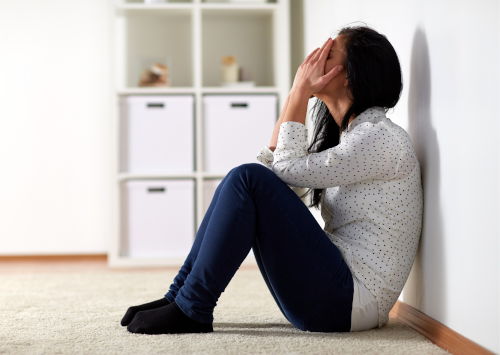In today’s fast-paced world, where stress and pressure are often part of everyday life, more and more people are suffering from sleep disorders or have problems sleeping through the night. The search for gentle and natural solutions to improve the quality of sleep has become increasingly important in recent years. One active ingredient that is attracting increasing attention in this context is cannabidiol, better known as CBD. This substance is extracted from the cannabis plant and has shown promise as a means of promoting a healthy sleep cycle – without causing the psychoactive effects of THC (tetrahydrocannabinol), another component of the plant.
In this blog article, we dive into the topic of CBD and sleep disorders. We look at how it works and the potential benefits for people who suffer from sleep problems. We also look at how it can be used in everyday life as a natural alternative to conventional sleep aids.
What are the properties of CBD?
Cannabidiol (CBD) is a chemical compound found in the cannabis plant and is a cannabinoid. It has received much attention in medical research and among the public in recent years, particularly because of its potential therapeutic properties and its ability to positively influence various health conditions without causing the psychoactive effects traditionally associated with cannabis. The following properties have been identified through research to date:
- anti-inflammatory effect: CBD has anti-inflammatory properties that make it potentially effective in the treatment of various inflammatory conditions and pain. Studies suggest that CBD can help reduce inflammation and relieve pain, making it a potential treatment option for conditions such as arthritis and multiple sclerosis.
- anxiolytic effects: CBD is often studied for its potential anxiolytic effects. Research suggests that CBD may help reduce anxiety, which could make it useful for individuals with various anxiety disorders such as generalised anxiety disorder (GAD), panic disorder, social anxiety disorder and post-traumatic stress disorder (PTSD).
- anticonvulsant properties: One of the best-researched uses of CBD is its ability to reduce seizures in certain forms of epilepsy. In some countries, CBD is approved in the form of Epidiolex, a prescription medication, for the treatment of two severe forms of epilepsy in children.
- neuroprotective effect: There is evidence that CBD has neuroprotective properties, which means that it could help protect nerve cells. These properties are being researched in relation to neurodegenerative diseases such as Alzheimer’s and Parkinson’s, with the hope that CBD could slow the progression of these diseases or alleviate the symptoms.
- influence on sleep: CBD is also being researched for its potential positive effects on sleep. Some studies and anecdotal reports suggest that CBD may help improve sleep disorders, for example by reducing the time it takes to fall asleep and increasing sleep quality.
Eliminate sleep disorders: Putting an end to the widespread disease
Sleep disorders can have a significant impact on many people’s quality of life and can have far-reaching health consequences in everyday life. CBD, the non-psychoactive part of the cannabis plant, has emerged as a promising option for those looking for natural methods to improve their sleep quality and counteract everyday stress.
The effectiveness of CBD for sleep disorders can be explained by various mechanisms. Firstly, CBD has potential anxiolytic properties that can be helpful in treating sleep disorders caused in combination with anxiety. Anxiety is a common factor that prevents people from falling asleep or staying asleep. By helping to reduce problems associated with anxiety, CBD can pave the way for a calmer and deeper sleep.
Secondly, some studies suggest that CBD may have a regulating effect on the sleep cycle by positively influencing sleep architecture, thus improving sleep quality and sleep hygiene. CBD could therefore help to prolong the period of deep sleep. This phase is crucial for the body’s recovery, while at the same time reducing the duration of light sleep. This change in sleep structure can lead to a refreshed awakening and an improved night’s rest.
In addition, research shows that CBD has anti-inflammatory and pain-relieving properties. For people whose sleep disorders are caused by chronic pain or inflammation, CBD could provide relief by addressing the underlying conditions, allowing for undisturbed sleep or sleep through the night.
In this context, special attention must be paid to the dosage of CBD, as this can vary greatly from person to person. While low doses of CBD can have an invigorating effect on some people, higher doses tend to have calming properties. It is therefore advisable to start with a low dose and gradually increase it until the desired effect is achieved.

CBD and sleep: What effects CBD has on sleep
The optimal dosage of CBD sleep drops to improve sleep can vary greatly depending on individual factors such as body weight, age, metabolism, and the type and severity of sleep problems. There is no universally recommended dose for taking CBD, as reactions to the active ingredient vary from person to person and the product strength also varies.
A general recommendation for starting is to begin with a low dose and gradually increase it until the desired effect is achieved. A starting dose could be in the range of 10 to 25 milligrams of CBD per night. Some studies suggest that higher doses of 25-75 mg CBD may be beneficial for sleep, but it is important to titrate individually to find the optimal dose for each person.
It is advisable to start with the lowest dose and carefully observe how the body responds before gradually increasing the dose. This approach helps to determine the most effective and minimum amount needed to improve sleep quality without unwanted side effects.
It is also important to note that CBD is available in various forms, including oils, capsules, gummies and sprays. The absorption rate and how quickly it works can vary depending on the form of CBD. For example, CBD oils that are applied sublingually (under the tongue) are absorbed faster by the body than capsules, which need to be digested. Therefore, the form of the CBD product should also be taken into account when determining the optimal dose.
How much CBD before sleep?
The optimal dosage of CBD sleep drops to improve sleep can vary greatly depending on individual factors such as body weight, age, metabolism, and the type and severity of sleep problems. There is no universally recommended dose for taking CBD, as reactions to the active ingredient vary from person to person and the product strength also varies.
A general recommendation for starting is to begin with a low dose and gradually increase it until the desired effect is achieved. A starting dose could be in the range of 10 to 25 milligrams of CBD per night. Some studies suggest that higher doses of 25-75 mg CBD may be beneficial for sleep, but it is important to titrate individually to find the optimal dose for each person.
It is advisable to start with the lowest dose and carefully observe how the body responds before gradually increasing the dose. This approach helps to determine the most effective and minimum amount needed to improve sleep quality without unwanted side effects.
It is also important to note that CBD is available in various forms, including oils, capsules, gummies and sprays. The absorption rate and how quickly it works can vary depending on the form of CBD. For example, CBD oils that are applied sublingually (under the tongue) are absorbed faster by the body than capsules, which need to be digested. Therefore, the form of the CBD product should also be taken into account when determining the optimal dose.
How quickly does CBD oil help you fall asleep?
The time it takes for CBD oil to take effect and help you fall asleep can vary from person to person. It is generally assumed that CBD oil works relatively quickly when taken sublingually (under the tongue), as the active ingredients are absorbed directly through the oral mucosa. This method bypasses the digestive tract, which means that the effects occur more quickly than with orally ingested products such as capsules or edibles.
On average, you can expect CBD oil to start working within around 15 to 30 minutes of ingestion, although for some people it can take up to an hour for the full effect to be felt.
CBD – the best effect for a balanced sleep
CBD, a non-psychoactive cannabinoid derived from the cannabis plant, has emerged as a promising natural alternative for those suffering from sleep disorders. Through its anxiolytic, anti-inflammatory and pain-relieving properties, CBD can potentially help improve sleep quality by reducing the time it takes to fall asleep and increasing sleep efficiency.
The optimal dosage and response time of CBD can vary from individual to individual, with sublingual CBD oil usually taking effect within 15 to 30 minutes. Despite the promising properties of CBD, it is important to consult with a physician regarding use and dosage, especially if other medications are already being taken. As research on CBD and sleep continues to progress, it offers a hopeful option for those seeking a more natural approach to improving their sleep.
Sources:
Lowin, T., Tingting, R., Zurmahr, J. et al. Cannabidiol (CBD): a killer for inflammatory rheumatoid arthritis synovial fibroblasts. Cell Death Dis 11, 714 (2020). https://doi.org/10.1038/s41419-020-02892-1
Crippa JAS, Derenusson GN, Ferrari TB, et al. Neural basis of anxiolytic effects of cannabidiol (CBD) in generalized social anxiety disorder: a preliminary report. Journal of Psychopharmacology. 2011;25(1):121-130. https://journals.sagepub.com/doi/abs/10.1177/0269881110379283
Moltke, J., Hindocha, C. Reasons for cannabidiol use: a cross-sectional study of CBD users, focusing on self-perceived stress, anxiety, and sleep problems. J Cannabis Res 3, 5 (2021). https://doi.org/10.1186/s42238-021-00061-5
Cooray, R., Gupta, V. & Suphioglu, C. Current Aspects of the Endocannabinoid System and Targeted THC and CBD Phytocannabinoids as Potential Therapeutics for Parkinson’s and Alzheimer’s Diseases: a Review. Mol Neurobiol 57, 4878–4890 (2020). https://doi.org/10.1007/s12035-020-02054-6




